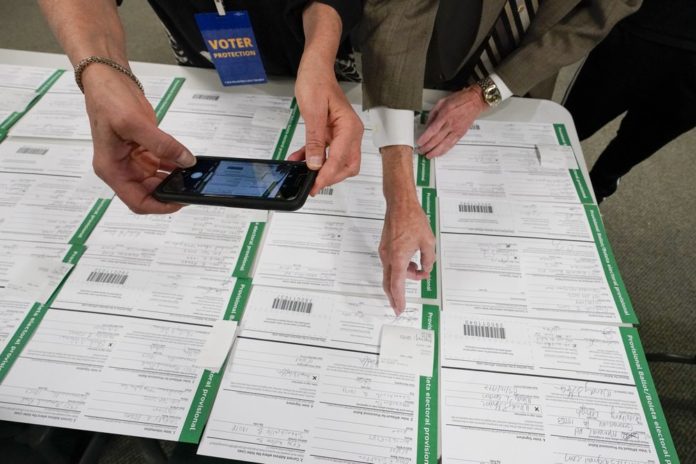Arizona Republican lawmakers heard Tuesday from members of the Texas-based conservative group that provided research for a widely debunked documentary that alleges widespread voter fraud led to former President Donald Trump’s loss in the 2020 election.
Cell phone data analysis done by True the Vote was used by conservative filmmaker Dinesh D’Souza in his film “2000 Mules” to try to show that Democratic operatives were paid to illegally collect and drop off ballots in Arizona, Georgia, Michigan, Pennsylvania, and Wisconsin.
The film has drawn crowds of Trump backers to theaters nationwide but had been widely panned by independent fact-checkers, including at The Associated Press.
The AP found that flawed analysis of cellphone location data and ballot drop box surveillance footage was used to cast doubt on the results of the 2020 presidential election nearly 18 months after it ended.
The group used GPS data to identify cell phones they say were repeatedly in close proximity to ballot drop boxes and also made repeated visits to nonprofit organizations that True the Vote claims could be involved in illegal ballot collection activities. True the Vote claims those cell phones must have been carried by people who were illegally collecting ballots and turning them in but has provided no video of anyone making multiple visits to a dropbox or evidence that they had ballots.
Catherine Engelbrecht, founder of True the Vote, and her associate Gregg Phillips presented their findings to eight Republican lawmakers in a live-streamed meeting at the state Capitol, but they did not present new evidence to support their claims.
Phillips said news stories pointing out the lack of proof were written by “journalistic terrorists.” But he declined to outline the methods, calling them “proprietary.” Engelbrecht declined to identify the nonprofits used in the analysis, which she said would interfere with law enforcement.
Phillips said he turned over data to Attorney General Mark Brnovich’s office a year ago, but the AG’s office told him it never received it.
Like many such efforts since Trump’s loss, “2000 Mules” used a tiny kernel of truth to help bolster its conspiracy theory. The film focuses in part on southwestern Arizona’s Yuma County, where the Arizona attorney general’s office indicted two people for illegally collecting ballots in the 2020 primary election.
Guillermina Fuentes and a second woman were indicted in December 2020 on one count of ballot abuse, commonly known as “ballot harvesting” and made illegal under a 2016 state law. Additional charges of conspiracy, forgery, and an additional ballot abuse charge were added last October. Her co-defendant awaits sentencing after pleading guilty to a reduced charge several months ago. Fuentes has a court date where she may change her not guilty plea later this week.
Fuentes, 66 and a Democrat, is a former mayor of the border city of San Luis and currently serves as an elected board member of the Gadsden Elementary School District in San Luis. She’s accused of collecting ballots in the border city in violation of the law that only allows a caregiver or family member to return someone else’s early ballot, and in some cases filling them out.
Her attorney has not responded to repeated inquiries seeking comment.
It is the only case ever brought by the attorney general under the 2016 law, which was upheld by the U.S. Supreme Court last year.
Records show Fuentes was under investigation within days of the August 4, 2020, primary election and knew she was a suspect by mid-September. There’s no sign she or anyone else in Yuma County collected ballots in the general election.
Ballot abuse is a felony that carries a possible sentence of up to two years in prison and a $150,000 fine.
The True the Vote representatives told lawmakers that they have no video from Yuma County and have only have obstructed surveillance footage from one drop box in Maricopa County.
Despite the lack of evidence of widespread problems with ballot drop boxes, several of the lawmakers said they’d push for laws restricting their use in future elections.
“I have been so pleased to hear about all you vigilantes out here who want to camp out at these drop boxes. Do it,” said Republican Sen. Kelly Townsend. She warned that there will be people monitoring dropboxes, following people to their car,s and writing down license plate numbers.
Republished with the permission of The Associated Press.














